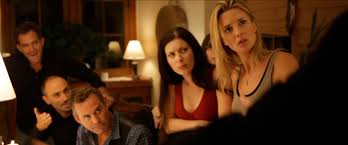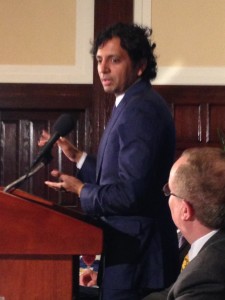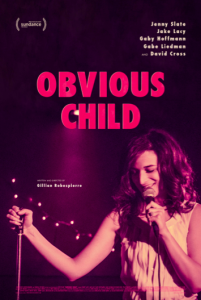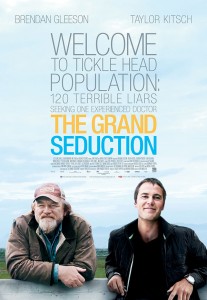Interview: James Ward Byrkit of “Coherence”
Posted on June 18, 2014 at 8:02 am
James Ward Byrkit wrote “Rango” and designed the visual effects for the “Pirates of the Caribbean” movies. His new movie, “Coherence,” is a nifty little mind-bender of a psychological thriller that makes the most of its micro-budget. He talked to me about filming in his own living room, without a crew, and telling the cast about their characters but not about what was going to happen to them.
This is a deliciously scary movie! Talk to me about how it all came together.
This was really just a reaction from all the movies that I had worked on, these huge blockbusters that you sort of plan in advance for years and years which I love. I loved working on the “Pirates of the Caribbean” movies and “Rango.” But because they are so planned, you sort of lose the ability to improvise. You lose the spontaneity of being in the mix with the actors. And I come from theater where I was trained to really just concentrate on story and character on a stage with actors and so I was craving getting rid of everything, getting rid of the crew; getting rid of script, no special effects, no support, no money, no nothing, and just getting back to the purity of that, of a camera in your hand and some actress that you trust and an idea.
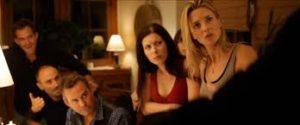
And no money means not having to account anybody. No notes from the suits.
Exactly! I needed that freedom and the freedom to experiment. We shot over five days, five nights actually, in my living room and instead of having a script, each actor was given a page of notes each day with their back story or sort of motivation for the night. But they wouldn’t know what the other actors had received so it had a very natural, very spontaneous collision of motivations that ended up being what you see on film; obviously guided by a very strict outline that we have been working on for about a year that tracked all the clues and the puzzles and all the rehearsals and things like that. But the actors weren’t aware of those, those things happened because we were sort of guiding them through it.
So the actors were all people that you knew pretty well?
Yeah exactly. They were just friends that I knew I could just call up and say, “Show up at my house in a couple days. I can’t really tell you what we’re doing, trust me I’m not going to kill you. It should be fun!” And they didn’t know each other before they got to my house and so I had to pick people that seemed to be like they could be couples, seemed like they could be best friends and that I just knew were up to the task of jumping into it.
I just assumed that they all knew each other very well because they fell into the kinds of rhythms that old friends have.
That’s just casting great people that could do that. Just five minutes after they arrived at my house they had to pretend to be married and lovers and best friends. Lorene Scafaria is a writer and director. I’d never seen her act before but I just had the feeling that she would be great. And so I said, “Do you want to act in something? Can you show up at my house next week and ready to make dinner for eight people?” So she had to cook the chicken.
I don’t want to give the movie’s surprises away, but the actors had another challenge as well.
What we usually say as a euphemism, we talk about fractured reality. Reality starts to fracture that night. And it gets very complicated, it gets very mind-bending and twisty but they love it. Once the actors realize that they are safe and it’s all about just being in the moment, it doesn’t matter that your character might have made a slightly different choice, slightly had a different time in their life, you are you right now and whatever immediate concerns you have is driving you and so whatever your relationship is or whatever your inner conflict is. These are all people who are either in hidden conflict with themselves or hidden conflict with each other and they understood that part of it. They didn’t have to understand the whole science fiction puzzle of it all.
Did you run into any unexpected problems in filming?
I wouldn’t say anything was actually wrong but you’re constantly dealing with unexpected things. One night we tried to shoot outside and we had to make the whole thing look completely desolate and the power being off; that was the one night that we had another movie shooting on our street. So the whole street is completely ablaze with lights and hundreds of extras. It turned out they were shooting a Snickers commercial. We would be right in the middle of the dramatic scenes and there would be another knock on the door that would just scare the hell out of everybody. And it would be the pizza guy you know, just bringing our food for the night. So when you don’t have a fully supported production, there’s a lot of things like that but you just have to roll with and make the best out of it.
It occurred to me as I was watching it that in a way it kind of paralleled the process of making a movie or editing a movie where you’ve got all these different fractured realities from the different takes and you’re trying to figure out how to piece it together.
That’s exactly it and especially because it wasn’t rehearsed. And we told them that they could go anywhere in the house they want to, we’ll follow them. So we have to improvise just as much to figure out how to make a good-looking frame on the fly. We have to figure out how to get it in focus. We have to figure out how to maneuver this mass of people because they basically become their own organism after a while. They got completely comfortable with each other. They started having their own surprising motivations as a unit, as a model and so you have to wrangle this whole thing. It’s like herding buffalo throughout an entire crazy, fun house of a puzzle.
There is also poignancy to it that I wasn’t really expecting. You really tapped into a very deep conviction that we all have that there is some other version of our lives somewhere else that’s going on that’s better, and where we should be.
That’s exactly it. That was the universe that we hoped would ground the whole thing because we said if we’re going to make a story like this that gets absolutely incoherent at one point, we have to have a solid throughline with a character. That is a universal concern that you think about; what would my life be like if I had made different choices. Is this the best version of my life I could have? What would the other version look like? And what would I do to get it? If you could see it again sometime, I promise you, you would like it even better the second time. You realize all the random stuff they are talking about in the first ten minutes at the party isn’t so random.

